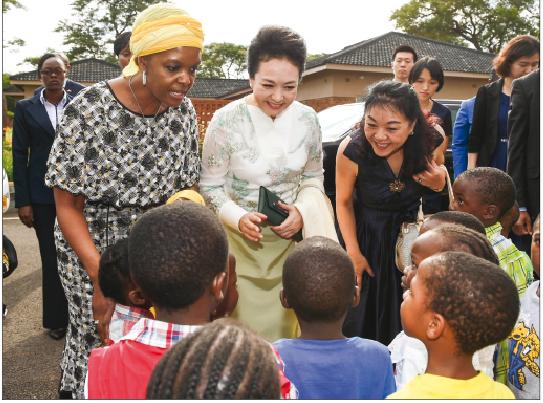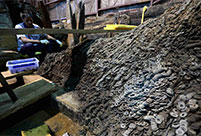

 |
| First lady Peng Liyuan, accompanied by her Zimbabwean counterpart Grace Mugabe, pays a visit to Grace Mugabe Children Foundation in Harare on Tuesday. Xie Huanchi / Xinhua |
Madame Peng Liyuan visited Grace Mugabe Children Foundation in Harare on Tuesday afternoon, during President Xi Jinping’s two-day visit to Zimbabwe.
She was warmly welcomed by Zimbabwe’s first lady Grace Mugabe and then visited orphans and abandoned children in the center with her entourage.
The center was founded by Grace Mugabe to care for orphans and abandoned children.
Peng had sent teaching facilities, as well as study and sport materials to the school.
She said orphans are the most vulnerable and at-risk community in a society, it is the common responsibility for the whole society to make them live a happy life and get a good education as other children do.
She said she hoped they all can grow up in a comfortable, safe and warm environment at the center.
Another school called Amai Mugabe School owned by the first lady has promised to give these orphans a free education.
At this school, Chinese language classes play a special role to advance cultural links and understanding, school administrators said.
At Amai Mugabe School, two educators from China are teaching Mandarin to the school’s 128 students, who range from preschool age to the seventh grade.
One of the teachers, Hao Xin, said Chinese has become a popular choice.
Grace Mugabe decided to learn Chinese in 2007 when she noticed the ever-strengthening ties between the two countries.
She earned a bachelor’s degree in Chinese from Renmin University of China in 2011, and while studying in Beijing, she learned a lot about Chinese culture and even became acquainted with traditional Chinese musical instruments.
Seeing the need for cultural exchanges between the two countries, Mugabe proposed that the Chinese government should send people to teach Chinese at her school.
Patrick Chitambo, the headmaster of the primary school, said language will be very helpful to students in the future, since it can be used in many projects undertaken between the two countries as ties grow stronger.
“With more students choosing to go to China, learning this language since primary school will be a big advantage for them,” he said.“When they finish learning Mandarin here, they will be well equipped with strong academic qualifications to proceed in their studies to upper degrees and even to China.”
Before coming to Zimbabwe in January last year, Hao, the teacher, had taught Chinese to foreigners for 10 years after finishing graduate studies in Chinese language teaching.
Her students in China were all adults, so it was a huge challenge at first to teach primary school students. However, she said, students at the school in Zimbabwe are enthusiastic and passionate about learning Mandarin.
“They are quite active in the class, and you will find huge differences between adult students and kids. Adults see the world with their own fixed perspective and sometimes even prejudice, but children are curious about the world,” she said. “So we hope to open a new window to them to understand the world by learning a new language.”
By learning Chinese, misunderstandings will be reduced and cooperation will be improved, especially because students will have a more comprehensive understanding of Chinese culture when they grow up, Hao said.
 |
 Contestants of Mrs. Globe pose for photo in Shenzhen
Contestants of Mrs. Globe pose for photo in Shenzhen
 Bikini models attend hot pot banquet in Hefei
Bikini models attend hot pot banquet in Hefei J-10B fighters with homegrown engine in test fligh
J-10B fighters with homegrown engine in test fligh Photos of U.S. Navy intruding in South China Sea released
Photos of U.S. Navy intruding in South China Sea released Cats who immediately regretted their life choices in photographs
Cats who immediately regretted their life choices in photographs Beautiful girl from police college becomes Internet hit
Beautiful girl from police college becomes Internet hit 10 tons of copper coins unearthed in 2,000-yr old tomb
10 tons of copper coins unearthed in 2,000-yr old tomb In Pics: Amazing Chinese fighters
In Pics: Amazing Chinese fighters
 Chinese, U.S. navies hold first-ever joint exercise in the Atlantic
Chinese, U.S. navies hold first-ever joint exercise in the Atlantic Top 20 hottest women in the world in 2014
Top 20 hottest women in the world in 2014 Top 10 hardest languages to learn
Top 10 hardest languages to learn 10 Chinese female stars with most beautiful faces
10 Chinese female stars with most beautiful faces China’s Top 10 Unique Bridges, Highways and Roads
China’s Top 10 Unique Bridges, Highways and RoadsDay|Week